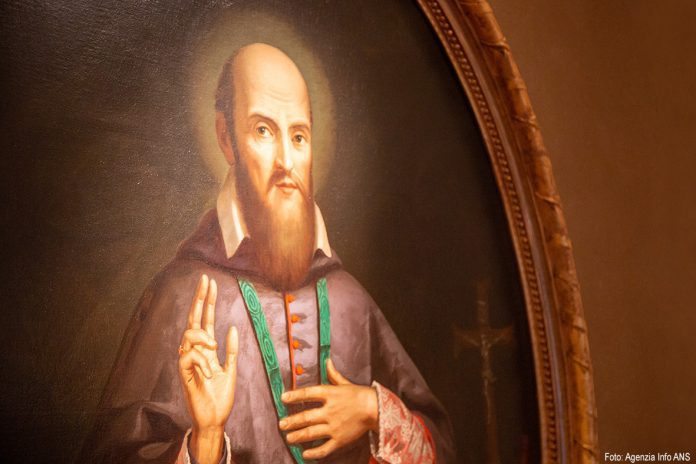Rome (Italy). On 24 January 2022 the Salesian Family celebrates the Feast of Saint Francis de Sales, Bishop and Doctor of the Church, on the 400th anniversary of his death (1622-2022).
In the introduction to Strenna 2022 “Do all through love, nothing through constraint” (St. Francis di Sales), the Rector Major, Fr. Angel Fernandez Artime, highlights the common roots of the Salesian Family, which draws daily from the Saint’s spirituality:
“The Constitutions of the Salesians of Don Bosco contain many elements and characteristics of the spirituality of Saint Francis de Sales. The same is true for the Daughters of Mary Help of Christians and for many other groups of Don Bosco’s Family, since their identity has many Salesian elements.”
Article 45 of the FMA Constitutions names St. Francis de Sales among the patrons given to the Institute by the Founder to accompany its journey, in communion with the Church: “We will entrust ourselves to these Sisters and Brothers of ours, looking to their lives as models and seeking help through their intercession, certain of sharing with them in the one communion of the Church.”
In the year of the 150th of Foundation of the FMA Institute (1872-2022), it is interesting to recall some references to St. Francis de Sales present in the sources of the Institute, studied by Sr. Piera Cavaglià, Secretary General emeritus:
“As for the Salesian Congregation, also for the Don Bosco Women’s Institute, he established that one of the decisive dates of the foundation process would fall on the feast of St. Francis de Sales. There was a discernment to be made and therefore it had to be carried out in the ‘Salesian’ spirit: 29 January 1872″ (Cf. Cronistoria I, 273-274).
On the day of religious profession (5 August 1872), in a familiar conversation with the first FMA, Don Bosco recalls St. Francis de Sales as a model of delicacy of manner (Cf. Cronistoria I, 300).
In the first Rules of 1878, the Philotea adapted to the youth of St. Francis de Sales is indicated among the texts for spiritual reading. It is prescribed to celebrate “with particular devotion and solemnity the feasts of St. Joseph, St. Francis de Sales, St. Teresa who are the particular patrons of the Institute.”
In the articles on the Novice Mistress, inserted by Don Bosco, there are implicit but evident references to St. Francis de Sales when the figure of the formator is outlined, who must be “affable and full of goodness” and when describing the spirit of Institute: “Do not forget that the spirit of the Institute is a spirit of charity and sweetness…”.
There is also evident harmony with the spirituality of St. Mary Domenica Mazzarello. The commitment to transform every needlepoint, every action, every moment of time into love, evokes an approach to life unified by the fundamental value of Christian life: love.
In the recommendation to the sisters: “Do freely whatever charity requires” (L 35,3) we find the resemblance to an essential password written in capital letters by St. Francis de Sales to Chantal: “We must do all through love and nothing through constraint!” (Letters to the Baroness de Chantal 14-10-1604, in Oeuvres XII 359). The theme chosen by the Rector Major for the Strenna 2022 comes from this sentence.
There is also an evident correspondence between Mary Domenica’s conception of ‘true religious piety’ and Salesian ‘devotion’. Mother Mazzarello said: “True religious piety consists in fulfilling all our duties in the right time and place and only for the love of God” (Cronistoria II 338).
Francis de Sales writes: “True devotion consists in embracing with promptness and love what pleases God; in doing everything with a spirit of gentleness and sweetness, with calm and humility …” (Introduction to the devout life, in Oeuvres III 15).
The humanism of the Holy Bishop of Geneva is pervaded with optimism, so he frequently writes to his penitent words of encouragement, “Live in joy, since our God is the God of joy.” “Healthy or sick, we always walk in joy.” “Live in joy even in the midst of all your afflictions.”
Mary Domenica recommends joy to the FMA; indeed, she demands it, insofar as it is an authentic proof of holiness: it is “a sign of a heart that loves the Lord very much” (L 60,5).
The Salesian heritage of Don Bosco and Mary Mazzarello was preserved and interiorized with great care by the FMA, not so much at the level of doctrinal study, but of spiritual experience lived in the Community. Especially in the first FMA, Salesian spirituality was rooted and continually revitalized through readings, reflections, and references from the Superiors. There are several degree theses on specific aspects of the spirit and communicative style of St. Francis de Sales presented by the FMA for the achievement of the degree.




















